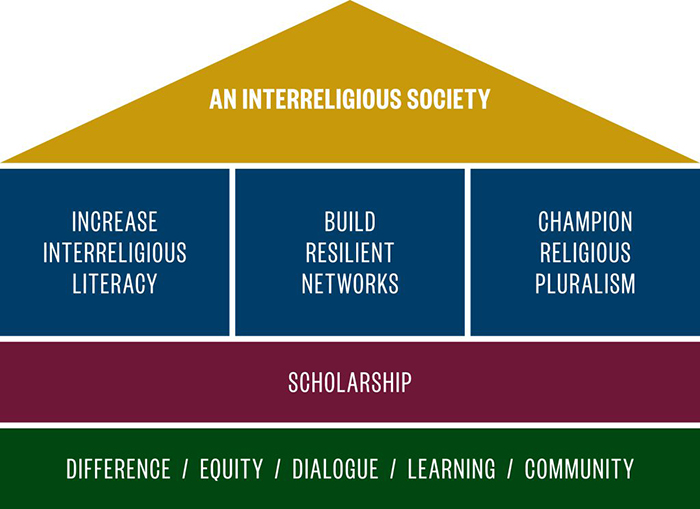ICJS Strategic Framework
Building an Interreligious Society
In 2021, the ICJS Board of Trustees approved a Strategic Framework with a new vision, mission, and goals for ICJS. That Strategic Framework was updated in 2024. The framework is depicted here as a house with the following components:
Foundation
ICJS’ five core values serve as the foundation for all of our work.
Ground Floor
Scholarship—including research, writing, teaching, and convening of leading voices—anchors all ICJS programs and advances the emerging field of Interreligious & Interfaith Studies.
Pillars
The three primary goals of our Strategic Framework hold up our vision of an Interreligious Society.
Roof
ICJS envisions an interreligious society where dialogue replaces division, friendship overcomes fear, and education eradicates ignorance.

Goal 1
Inspire the public to champion religious pluralism
Primary Aim: Act as a thought leader to help the American public value religious difference.
- Name, describe and model our vision of a multireligious democracy.
- Expand the public understanding of religion and interreligious engagement.
- Participate in the public media landscape and be a resource for journalist.
- Speak out against threats to a multireligious democracy in the U.S., particularly as related to Islamophobia, antisemitism, Christian nationalism, and anti-religious bias.
- Use partnerships with secular, religious, and interreligious organizations to reach a broader audience and promote more conversations about religion in the public square.
- ADVANCE EQUITY: Commit to fostering a culture of equity and inclusion in the ICJS vision of religious pluralism.
Goal 2
Increase interreligious literacy
Primary Aim: Equip our learning communities with knowledge about the religious traditions, teachings, practices, and history of Judaism, Christianity, and Islam for interreligious understanding and dialogue.
- Offer learning opportunities on the intersection of religion and civic life, particularly as it relates to a multireligious democracy.
- Engage with stories as seen in history, texts, and lived experience to explore how religion and interreligious encounter are present in public life.
- Use ICJS teaching activities as opportunities to explore new ideas and increase the production of knowledge.
- ADVANCE EQUITY: Include voices and contributions of diverse religious, racial, and gender perspectives in our educational offerings and resources.
Goal 3
Develop resilient interreligious leaders
Primary Aim: Facilitate strong relationships among people with diverse religious and nonreligious identities who work against religious bias and bigotry and work together for the common good.
- Focus on both religious and civic sectors (e.g., education, nonprofit)
- Enable religious and community leaders to become confident in recognizing where religion appears in public life, addressing it, and speaking against religious bias and bigotry.
- Expand the capacity of religious and community leaders to build religious pluralism and speak for a multi-religious democracy.
- ADVANCE EQUITY: Recruit participants from the diverse community within which we live, particularly with Muslims, people of color, and women.
Goal 4
Advance the field of Interreligious & Interfaith Studies
Primary Aim: Be a leader in academic discourse and publishing on core concepts and principles in this emerging field.
- Explore and develop new paradigms on religious difference and religious pluralism.
- Support and promote the interreligious research, writing, and expertise of ICJS staff.
- Inspire scholars in academia to develop interreligious literacy in their research, courses, and seminars.
- Develop and demonstrate scholar-practitioner models as an interreligious orientation to academic inquiry.
- Provide service to the field.
- ADVANCE EQUITY: Include a diverse range of participants, partners, citations, and speakers in our academic work.